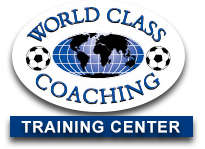I feel that one of the most important responsibilities of a coach is to constantly evaluate WHAT they choose to teach their players, HOW they go about teaching it and most importantly, WHY they are choosing to focus on those topics. Without this kind of evaluation there is a real danger that we can fall into a rut of just teaching the topics we've always taught with the same drills and exercises without a vision of why we're doing it.
There are a number of very good and thought provoking articles that will help guide your evaluation. Here are a few of the ones that I've found the most helpful:
Developing a Coaching Philosophy as a Youth Soccer Coach - by Gary R. Allen
"Just as it is necessary for builders to cut deep into the ground for a foundation of a tall building, so you are laying the groundwork for the future. No one looks in awe at the gaping hole that is dug, or ever sees the concrete laid for a building's foundation once it is built, but in order for a beautiful and majecs...tic building to rise, the solid, but unseen, foundation is necessary."
"This is why it is so important that the driving forces behind your coaching philosophy transcend the here and now. Doing so may cause some anxious moments as to immediate results in any given game, but it will develop the players themselves as decision-makers, and, more importantly, will cause themto value the game as their own, and provide for them the intrinsic motivation of accomplishment and being in control."
"To do so as a coach requires the ability to withsand the constant pressure of parents and others trying to convince themselves that these players have already arrived as players."
Games and Scrimmages in Training vs Drills, Exercises and Activities - by Lawrence at finesoccer.com
"The problem with coaches who just do drills, exercises and activities is that they will end up BORING the players to the point where they don’t want to come to training anymore. While repetition is important, if the players don’t see how it relates to a game like situation they won’t get much from the repetition. An example would be if a coach were to make me strike the ball with my instep against a wall 500 times a day to get better at shooting. The truth is that this doesn’t make me better at shooting. What it does do is make me better at striking the ball against the wall unless I can see how that builds into shooting on goal in a game.
On the other hand, if a coach thinks the way for players to become better at shooting is to have them scrimmage all the time and in these scrimmages the players are shooting with poor form, this isn’t going to make them better since practice doesn’t make perfect it simply makes permanent."
Kids First Soccer Coaching Philosophy - by Daniel Frankl, Ph.D
"Legendary UCLA Basketball coach, Dr. John Robert Wooden, winner of an unprecedented and unmatched ten (including seven consecutive--1966-73) NCAA Men's Basketball championships during a 40 year career 885-203 win-loss record, simply describes himself as "teacher."
"When the game is over, I want your head up--and I know that you did your best...This means to do the best you can do. That's the best; no one can do more...You made that effort."
Approaching to coaching are as varied as the coaches that implement them. One of the reasons that the game is consistently interesting is that there are many ways to play it effectively. There are just as many ways to teach the game to children. If your approach is well thought out, is based on your experience and personality and has the best interest of your players in mind then who's to say that your way of coaching is 'wrong'. Beware of the person who claims to have all the answers; they probably want to sell them to you.
Is there a book or article that has had a major impact on your coaching philosophy?


